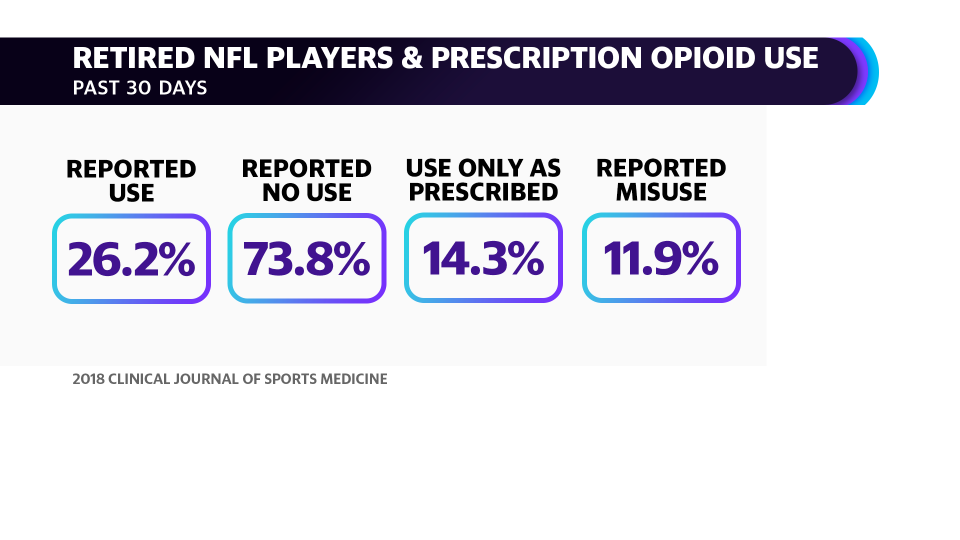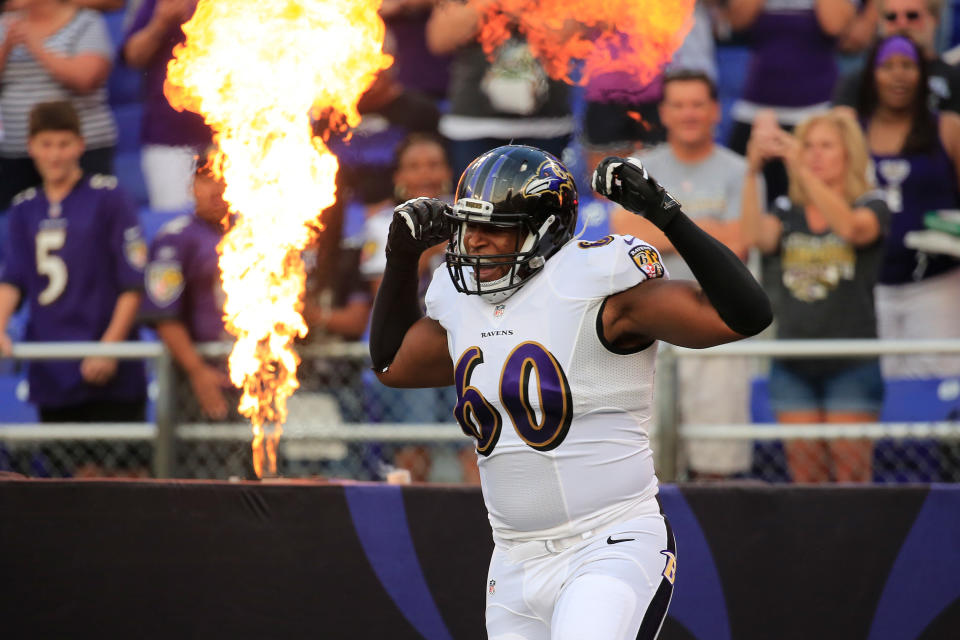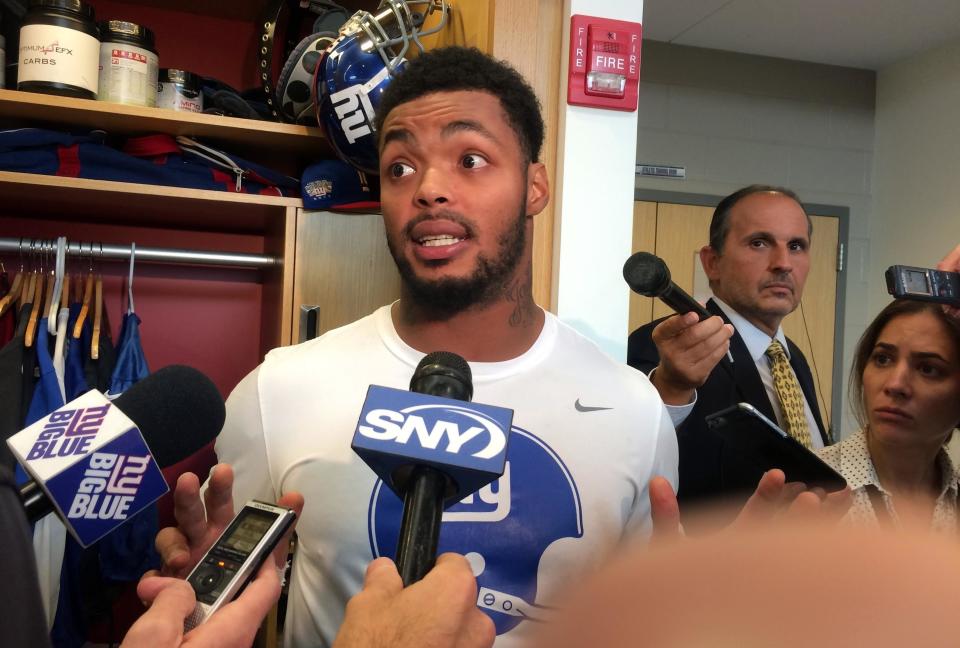'These players are suffering': Doctors, ex-players push the NFL to change its pot policy
As more states legalize medical marijuna, former NFL players have a message for the league’s top brass: stop punishing players for using cannabis.
“This isn't a joke,” Eugene Monroe, former offensive tackle for the Baltimore Ravens, told Yahoo Finance. “This is men's lives that you have decision to make a huge impact on. There are players suffering.”
Monroe — the first active NFL player to openly advocate for the use of medical marijuana, and dropped by the Ravens after making his public stance — is pushing the NFL to reform its cannabis policy in partnership with prominent physicians who agree that the league’s no tolerance rule is doing players more harm than good.
He’s not alone. Earlier this month, Cowboys lineman David Irving said he was quitting the NFL over its weed policy after he was suspended indefinitely for violating it.
‘NFL players experience a high degree of pain’
Under NFL rules, players are prohibited from using cannabis, even to treat medical conditions in states where medical marijuana is legal.
“It doesn't matter where you live, you're bound to the rules,” Monroe said. “So if you live in Colorado and you play for the Broncos, and you test positive, you will be punished regardless of that state having both medical and recreational programs.”
Active players face a difficult choice between medical cannabis and other medications such as opioids used to treat pain and other ailments. Cannabis use can result in escalating penalties, and even league suspension, for repeat offenders.
“It's a well known fact that NFL players experience a high degree of pain,” Monroe said. “We also see synonymous with that fact, a higher usage of opioid drugs. Our goal is really to use this as an example, to use this as the beacon to say, ‘Hey this is a population of people who are experiencing a great benefit of using this drug for their pain relief for their insomnia, for their stress, for all of these things that there are millions of people around the world that are fighting for.’”

Retired NFL players are four times more likely to use painkillers than the general population, according to 2011 research from the Washington University School of Medicine.
A 2018 study published in the Clinical Journal of Sport Medicine found that among retired NFL players, 26% reported use of prescription opioids within the last 30 days, and of those who reported use, 12% said they used opioids other than as prescribed or opioids that were not prescribed to them.
Despite its federal prohibition and continued classification as an illegal Schedule I substance, cannabis has been legalized for medical use by 33 states and the District of Columbia, and is recognized as effective in treating chronic pain, seizures, severe muscle spasms, and other conditions.
“If you ask the top guys — which they won't admit because they can't admit it — does [cannabis use] stop them, or does it stop their progress or their progression in the sport? They would say no,” Jonathan Casillas, former linebacker for the New York Giants, told Yahoo Finance. “It has a lot of benefits for them and for myself and for Eugene, and for the guys that know about the medicinal benefits of the plant.”

‘Let’s use some of that money to research cannabis’
NFL Commissioner Roger Goodell told ESPN in 2017 that he wants to make sure negative consequences of cannabis are not something the league is held accountable for years down the road. Goodell told ESPN the NFL had been studying the issue though its advisors who, at the time, had not indicated a policy change was in players’ best interests.
Goodell is misinformed, according to David Nathan, a psychiatrist who founded Doctors for Cannabis Regulation, which unites physicians and current and former NFL players to push for reforming the league’s marijuana policy.
“The NFL claims to be listening to its doctors but those same doctors are beholden to the NFL, and they know where their paycheck comes from,” Nathan said. “The great majority of American physicians understand the medical use of cannabis, so the fact that they're saying their doctors recommend against it is either incorrect or the doctors are feeling some coercion.”
However, he added, “It's not to say that everybody should be using cannabis in place of those other two categories .... What we need is choice. Even if you think that there is no medical use for cannabis, for god's sake it should not be against NFL rules.”
Doctors for Cannabis Regulation and its former NFL members say their mandate is threefold: Regulate rather than simply decriminalize cannabis so that the quality of medical products remains safe; permit professional athletes to access medical and recreational cannabis where it has been legalized; and stop punishing player use because it exacerbates a larger social problem where African Americans are punished for cannabis more frequently than white Americans.
Nathan acknowledged that studies show some marijuana users become dependent on the substance, and that the extent to which daily use is harmful to health is unknown. Still, Monroe suggested the NFL should spend money looking into the benefits of marijuana.
“The NFL has earmarked $100 million for player health and safety,” Monroe said. “Let’s use some of that money to research cannabis.”

Under the NFL union’s next collective bargaining agreement, to be renegotiated by 2021, the NFL is reportedly willing to consider changes to its cannabis policy. Doctors for Cannabis Regulation says that’s not where the debate belongs.
“If you treat players’ health and their use of cannabis as being a negotiating point, then what are you saying about if you're the commissioner or the owners? What are you saying about how you regard the lives of your players?” Nathan asked. “Players’ health should never be negotiable.”
Monroe said changes don't have to wait until the collective bargaining agreement is re-negotiated.
“There's no law that prevents the NFL from removing cannabis from its list of banned substances,” he said. “We need to change the culture of medicine in sports, and it starts with removing cannabis as a banned substance.”
Alexis Keenan is a New York-based reporter for Yahoo Finance. She previously produced live news for CNN and is a former litigation attorney. Follow on Twitter at@alexiskweed.
More from Alexis:
Boeing could face ‘absolutely devastating’ economic impact after crash
Tesla’s move to close stores puts dealer franchise debate in the spotlight
How the legal fight over Trump’s border wall could hurt the economy
Weed consumers no longer ‘stoner that lives in his mom’s basement’: CEO
NYPD: Waze users who post sobriety checkpoints may be committing crimes
How legalized cannabis changed Colorado in the past five years
